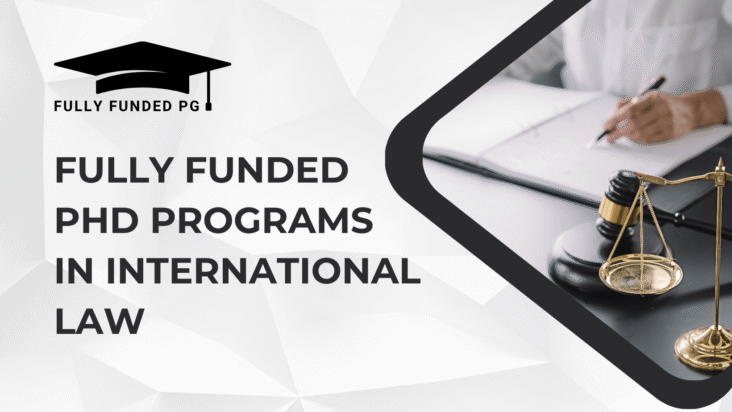International law shapes the rules and principles that govern relations between states, international organizations, and individuals across borders. From tackling climate change and regulating armed conflict to promoting human rights and shaping global trade, international law is central to addressing the world’s most pressing issues.
As legal frameworks continue to evolve in response to global challenges, the demand for legal scholars with a deep understanding of international legal systems is greater than ever. Pursuing a PhD in International Law not only allows you to engage critically with these global dynamics but also equips you to influence policy, advance justice, and contribute to the development of international legal norms.
However, doctoral studies in law can be financially demanding, making fully funded PhD programs an essential opportunity for aspiring legal researchers. These competitive programs cover tuition fees, offer a generous living stipend, and provide access to top-tier academic resources and supervision. They enable students to dedicate themselves fully to their research without the added stress of financial constraints.
If you’re passionate about global justice and committed to exploring the legal dimensions of international relations, the UK is home to some of the world’s most prestigious law schools and research centers. Below, we highlight five of the best fully funded PhD programs in International Law available in the UK, each offering exceptional training, resources, and support to develop the next generation of legal scholars and practitioners.
1. University of Oxford
The University of Oxford is internationally renowned for its excellence in legal education and its rich tradition of scholarship in international law. Through its Faculty of Law, Oxford offers a rigorous DPhil (PhD) in Law with opportunities to specialize in various aspects of international law, including human rights, international humanitarian law, environmental law, and trade law. The program is deeply research-focused, encouraging candidates to engage with pressing global legal issues while contributing original scholarship to the field.
Students benefit from world-class supervision, access to the Bodleian Law Library, one of the most extensive legal research libraries in the world, and a vibrant academic community that includes regular seminars, workshops, and conferences. Oxford’s emphasis on interdisciplinary collaboration also allows PhD candidates to interact with scholars from fields such as international relations, public policy, and global governance.
The University of Oxford offers a fully funded PhD scholarship in international law through the Clarendon Fund, one of the university’s most prestigious scholarship schemes. The Clarendon Fund covers full tuition and college fees and provides a generous annual living stipend to support doctoral students throughout their studies.
Available to both domestic and international students, the scholarship is awarded based on academic excellence and potential. Clarendon scholars in law often engage with major research centers such as the Bonavero Institute of Human Rights and the Oxford Institute for Ethics, Law and Armed Conflict (ELAC), giving them the opportunity to work on cutting-edge legal issues with direct real-world relevance. With a strong emphasis on research impact and policy engagement, Oxford provides an ideal environment for future international law scholars and practitioners to thrive.
Application Deadline: December–January annually
2. University of Edinburgh
The University of Edinburgh’s School of Law is highly regarded for its contributions to public international law, legal theory, international human rights, and global governance. With a strong academic tradition and a commitment to research that tackles contemporary global challenges. The university offers a dynamic and intellectually rich environment for doctoral study. The School is also home to the Edinburgh Centre for International and Global Law, which brings together scholars from various disciplines to explore the intersections of law, politics, and global justice.
PhD candidates benefit from expert supervision, access to extensive legal resources, and involvement in active research networks that include international collaborators and practitioners. The program is ideal for students seeking to make meaningful contributions to both academic debate and practical policy developments in international law.
The University of Edinburgh offers a fully funded PhD scholarship in international law through the Edinburgh Global Research Scholarships, which are awarded to outstanding international students pursuing doctoral research. This funding opportunity typically covers full tuition and provides a living stipend to support students throughout their program.
Additional sources of funding, such as the Carnegie PhD Scholarships and the AHRC Doctoral Training Partnership, also support exceptional students with tuition and maintenance awards. Doctoral candidates at Edinburgh are encouraged to publish their work, participate in international conferences, and collaborate with legal professionals, policymakers, and NGOs. With a strong emphasis on real-world impact and academic excellence, Edinburgh provides a supportive and stimulating environment for future leaders in international legal scholarship.
Application Deadline: February each year.
3. University of Manchester
The University of Manchester’s School of Law is a dynamic and internationally engaged center for legal scholarship, with particular strengths in international economic law, human rights, and transitional justice. The School fosters a research environment that is both intellectually rigorous and socially responsive, offering PhD candidates opportunities to explore global legal challenges through interdisciplinary and comparative approaches.
Manchester is home to the Manchester International Law Centre (MILC), a hub for innovative research that connects scholars, practitioners, and institutions around the world. PhD students at the School of Law benefit from expert supervision, frequent research seminars, and access to a wide network of academic and policy-related collaborations, making it an ideal setting for pursuing impactful doctoral research in international law.
The University of Manchester offers a fully funded PhD scholarship in international law through the North West Social Science Doctoral Training Partnership (NWSSDTP). This competitive studentship covers full tuition fees, provides a generous UKRI-aligned maintenance stipend, and includes funding for training, fieldwork, and conference travel. Applicants are encouraged to propose research projects aligned with the School’s key areas of strength, such as global justice, legal responses to conflict, or the role of law in global governance.
With access to cutting-edge legal research resources and professional development opportunities, students are well-equipped to contribute to meaningful legal scholarship and influence international legal practice.
Application Deadline: Usually around February.
4. University of Liverpool
The University of Liverpool’s School of Law and Social Justice stands out for its progressive and interdisciplinary approach to international law, with key strengths in human rights, gender justice, and migration law. The School encourages critical scholarship that addresses pressing global issues and challenges traditional legal paradigms.
Through research centers such as the European Children’s Rights Unit and the Centre for the Study of International Slavery, PhD students are supported in producing work that has both academic and societal impact. The School fosters a collaborative research environment, offering regular seminars, peer engagement, and access to a wide array of legal and social justice resources.
The University of Liverpool offers a fully funded PhD scholarship in international law through the Economic and Social Research Council (ESRC) and the Liverpool Doctoral College Scholarships. These studentships typically cover full tuition fees, a UKRI-standard living stipend, and access to additional funding for fieldwork, conferences, and training.
Many awards also offer teaching and research assistantship opportunities, helping students build professional experience alongside their studies. With a strong emphasis on inclusive and engaged research, Liverpool’s PhD program empowers scholars to work closely with NGOs, legal institutions, and international partners to shape real-world legal and policy outcomes.
Application Deadline: April Yearly.
5. King’s College London
King’s College London ranks among the top institutions for international law research. The Dickson Poon School of Law enjoys a stellar global reputation and is especially well-regarded for its contributions to public international law, climate justice, global security law, and humanitarian law.
The school fosters a dynamic academic environment where doctoral researchers are encouraged to tackle some of the world’s most pressing legal issues through rigorous and interdisciplinary scholarship. Located in the heart of London, King’s also offers unparalleled proximity to international courts, law firms, and policy institutions.
King’s College London offers fully funded PhD scholarships in international law through King’s China Scholarship Council Phd Scholarship Programme, which generally covers full international tuition fees, provides a generous tax-free stipend for living expenses, and includes research or travel funding for conferences and fieldwork.
Doctoral candidates benefit from close mentorship, access to international legal networks, and numerous opportunities to engage with real-world legal debates and policymaking through King’s deep institutional connections and central London location.
Application Deadline: April Yearly.
Conclusion
Pursuing a PhD in International Law is a powerful way to enter the arena of global influence, whether as a legal scholar, policymaker, humanitarian advocate, or international diplomat. Fully funded PhD programs in the UK make this journey more accessible, providing not just financial support but academic mentorship, professional development, and access to global legal institutions.
Whether you’re driven to challenge injustice, reform international systems, or shape future treaties, these programs offer the perfect launchpad for your vision. With world-renowned faculty, vibrant research communities, and strong ties to international organizations, the UK remains a leading destination for aspiring legal minds committed to making a meaningful global impact.

